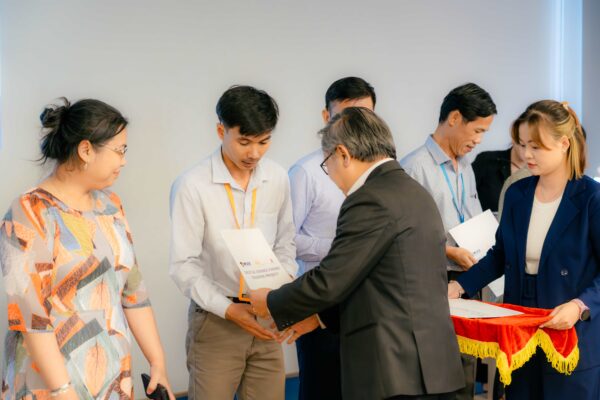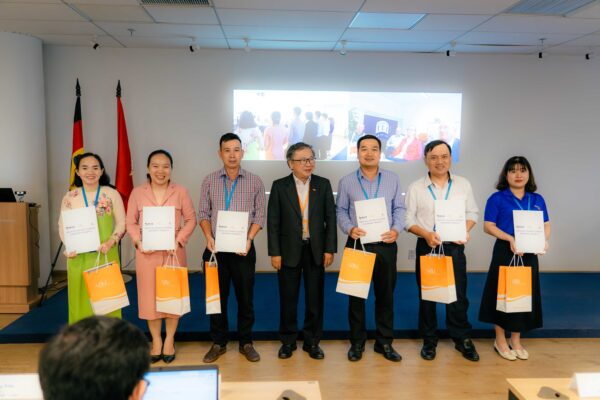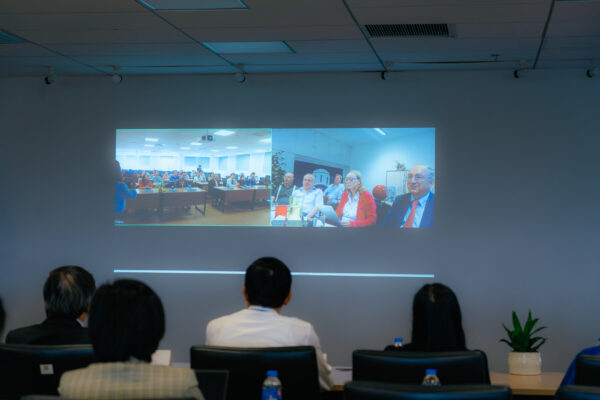Binh Duong 6th Sep 2024 — The Vietnamese-German University (VGU), Hessische Landesstelle für Technologiefortbildung (HLfT) and Word Service University in Germany (WUS) are pleased to announce the successful completion of the Digital Change Expert (DCE) Training project, marked by an awarding and closing ceremony held today in Hessen, Germany.
The DCE Project, financed with funds from the Hessen Ministry of Economics via WUS, a pioneering initiative aimed at enhancing digitalization in Vietnam’s vocational education and training (VET) institutions, is a collaborative effort between VGU, WUS, and HLfT. Over the course of the project, ten educational institutions participated, with 30 trainees, including Rectors, Vice-Rectors, Heads of Academic/IT Departments, and faculty members, engaging in a comprehensive training program.
This project was meticulously planned and executed in four phases: Standard Development, Training Needs Analysis, Training, and Evaluation, from Jan 2023 till Sep 2024.
About the key stakeholders of project:
World University Service (WUS) is the primary sponsor of the project, providing the necessary financial with funds from the Ministry of Economics of the State of Hessen/Germany and strategic support to ensure the project’s successful implementation.
HLFT serves as the designated training institution, responsible for designing and delivering educational and training programs to the project’s participants, ensuring that they acquire the necessary skills and knowledge.
Vietnamese-German University (VGU) is the first public university in Vietnam with an international partner country – Germany. A decade after its establishment, the VGU model symbolizes the partnership between Vietnam and Germany. The VGU is a “light house” project of transnational cooperation. While being a Vietnamese State University and jointly set up with Germany, the university adopts German academic models and standards, whereby VGU study programs are organized with its partner universities ensuring excellence in teaching and research. In this DCE project, VGU acts as the local host, providing the venue, local coordination, and logistical support for the project’s activities, ensuring smooth operations on the ground.
Key Achievements
A key factor in the success of the project was the collaborative approach taken by the participating institutions, which allowed for the sharing of best practices and the development of a cohesive strategy for digitalization across the VET sector. The project also emphasized the importance of aligning digital transformation efforts with the specific needs and capacities of each institution, ensuring that the solutions developed are both practical and sustainable.
- Number of participants and institutions: 31 participants from 10 institutions, higher than the planning with 10 participants from 10 institutions
- Handbook institution (Project’s productions): 12 handbooks (private and group)
- Result of final survey:
- 100% Trainees said they are satisfied with the training course
- Almost 90% of trainees said they can apply what they learnt to the practical and at their institutions.


Final Project and Future Implementation
As a culmination of the training, participants presented final projects that showcased their innovative ideas and strategic plans for implementing digital transformation within their institutions. These projects included detailed roadmaps for deploying digital tools in vocational training, strategies for upskilling faculty members, and plans for engaging students in digital learning environments.
Key points from the DCE trainees’ handbook presentation
Looking forward, VGU and its partners have outlined a clear plan for the practical implementation of these projects. This includes ongoing support and mentorship for the participants as they begin to roll out their initiatives, as well as a structured evaluation process to monitor progress and ensure that the intended outcomes are achieved.
The Future of the DCE Project
The DCE Project is not just a one-time initiative; it represents a long-term commitment to the continuous improvement of vocational education in Vietnam. VGU, HLfT, and WUS are dedicated to expanding the project’s reach, potentially involving more institutions and extending the training for further VET schools.
Sharing about the project
Dr. Kambiz Ghawami, Chairman of WUS: “I am pleased that due to the very good results of this first round, a new round of training with new schools and teachers will start on October 1 2024 until September 2026 and that we can once again carry out this very innovative program together with VGU and HLfT with the support of the State of Hessen as part of the good and long-standing cooperation between Hessen and Vietnam”.
Dr. Vien, Ha Thuc Vien, Vice President of VGU “We have reason to be proud of what we have achieved. But at the same time, we also need to recognise that this is just the beginning of a longer journey of digitalization. The knowledge and skills that you have accumulated will be a solid foundation to continue to promote and create positive influences in your work and institutions as well as the community”
Ms. Sabine Kaempf, Director of HLFT: “The success of this first phase has created a strong foundation for what comes next. We are excited to announce that, due to the achievements we’ve seen so far, we are planning a second phase of the project. This next phase will build on the momentum we’ve created and will focus on deepening and expanding digital transformation in your schools.
In the upcoming phase, we will have the chance to take everything we’ve learned and push the boundaries of what’s possible in digital education.”
From DCE participants:
“We have shared the knowledge we gained from the Digital Transformation Expert course with our colleagues at the school. They were very excited about these new insights. We have also applied the knowledge from this course to create video clips for student recruitment activities, promote the school, and produce videos to support the teaching of various disciplines offered at our school.”
“I have applied a lot of this to my own work. However, from a collective perspective, I haven’t been able to apply much due to various factors such as viewpoints, budget, and the digital transformation strategy of the organization.”
“Digital transformation must begin with addressing fundamental issues, and the role of the leader is crucial. Leaders must embrace new and challenging aspects to successfully drive the transformation.”

The project team joined the online conference from Germanny.
End./.
